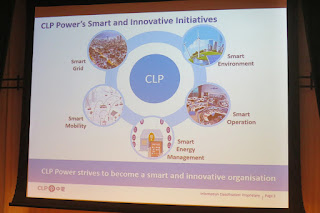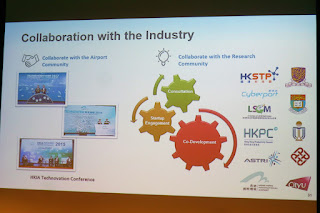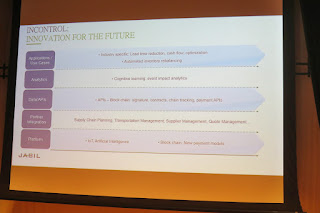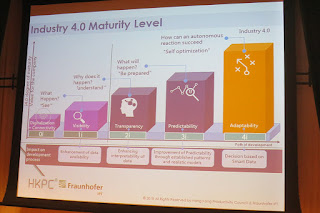The Federation of Hong Kong
Industries (FHKI), with support of HKSTP, KPMG and KPMG organized the
Industrialist Forum to provide platform where industrialists, investors/capital
providers, academia and government officials exchanged views on the prospects
of Hong Kong industries. Industrialist
Forum 2018 was held on 30th May 2018, which aimed to tie in
technology and innovation initiatives rolled by the HKSAR government in Policy
Address and the Budget so as to look into the prospectus of advanced
manufacturing in Hong Kong. I met HKSQ
senior member Mr. Albert Cheung who was one of speakers in the forum and we
took a photo for memory.
In the beginning, Mr. Jimmy
Kwok (Chairman, FHKI) gave a welcome speech.
Firstly, he briefed HKSAR government new initiative to support
industries and SME. He mentioned that
cooperation between government and industries could create new market and new
value.
Mr. Paul Chan, GBM, GBS,
MH, JP (Financial Secretary, HKSAR) was guest-of-honour and gave opening speech. He said Innovation and Entrepreneurship were
a global trend. Since ITB established in
2015, we were not discussed “Do or Not” but “How to catch up”. He shared his visit on Hangzhou (杭州) and Guizhou (貴州) and observed their development on internet, big
data, AI and smart city, etc. He said we had world class universities, top tier
talents, excellence legal system, and IP protection, etc. He had confident that
Hong Kong to be Global Innovation and Technology Centre.
Group photo
AM Session – Plug into I&T for New Businesses
The first keynote speaker
was Mr.Nicholas Yang, GBS, JP (Secretary for Innovation and Technology, HKSAR)
and his topic entitled “Innovation and Technology Initiatives Rolled out by the
Government”. Firstly, he briefed several
new policies on Innovation and Technology (I&T) especially on Re-industrialization. We focused on Advance Manufacturing, AI, Data
Analytics, etc. to retain and attract high value-added industries in Hong Kong.
He added that we had new infrastructure, HKPC & HKSTP co-working space,
ITFs and education input such as post-doc subsidies. He hoped to lead re-industrialization through
Government-Industry-University-Institute (官產學研) collaboration.
The second keynote speaker
was Mr. TK Chiang (Managing Director, CLP Power HK Ltd.) and his presentation
named “Digital Utility of the Future”. In the beginning, Mr. Chiang said that
technology changed the world, making yesterday’s impossible into today’s
possible.
Then Mr. Chiang mentioned CLP Power’s Smart and Innovative Initiatives included Smart Environment, Smart Operation, Smart Energy Management, Smart Mobility and Smart Grid.
After that he selected
three of initiatives for sharing. The
first one was Smart Environment that their electricity sales increase but total
emission reduced through deploying new gas storage and generation technologies
so as to driving for better air quality and lower carbon. Secondary, Feed-In
Tariff would be effective on 1st Oct 2018 to encourage private PV
system connection to Grid so that we could play a part in combating climate
change. Another initiative was used VR
for Power System Training. At the end,
he introduced CLP Smart Energy Experience Centre which employed AI Chatbot and
smart home system where some technologies were from Science Park companies.
Dr. NT Cheung (Head (IT
& Health Informatics) & Chief Medical Informatics Officer, Hong Kong
Hospital Authority) was
the third keynote speaker and his presentation title was “The
Data-Driven, Cloud-Powered Mobile Future of Healthcare in Hong Kong”. He briefed the Hong Kong’s Dual Track
Healthcare System included public (2.8% GDP with 88% inpatients) and private
(2.9%GDP with 12% inpatients). Then he introduced Hospital
Authority which established in 1991 and their eHealthe journey.
After that Dr. Cheung
briefed Clinical Management System (CMS) IV – 5Ps and they were Patient
Centred, Paperless, Protocol Driven, Closed Loop and Personalized. Then he stated 3 key disruptive technologies
we faced were Mobile, Cloud & IoT, as well as, Big Data & Machine
Learning. And then he briefed IT
Innovation Framework to us. HA Data
Collaboration Lab (HADCL) was employed that HA Cloud together with HA Data
would improve HA’s care delivery so as to enhance care quality and efficiency.
Finally, he briefed HA’s
Big Data included 11M patients, 467M episodes of care, 2.7B laboratory results,
3.7M operation records, 990M drug items and 100TB radiology images per year,
etc. He also share Hong Kong Healthcare
Cloud vision to us at the end.
Mr. Andy Bien (Chief
Information Officer, The Airport Authority Hong Kong) was the fourth keynote speaker
and his topic was “The Smart Airport”. Firstly, Mr. Bien briefed HKIA was the third busy
airport in the world and was the first busy on air cargo traffic in 2017.
Then Mr. Bien stated the
traffic growth at HKIA upto 155% of Passenger, 206% of Cargo and 158% of Air
Traffic Movement from 1998 to 2017! They
had the following challenges including rapid grow, capacity constraint, labor
shortage and passenger expectation increased.
Therefore, a new runway (3rd
Runway System) was planned to be built.
After that Mr. Bien briefed
they made use of innovation and technology to enhance efficiency and deliver
superior passenger experience. Some key
enabling technologies for Smart Airport Vision were mentioned such as Advanced
Biometrics (single token for passenger journey), Mobile & Self Service
Technology (Check-in Anywhere Anytime), Robotics (Baggage Loading Assistance
and Automated Bridge Docking) and Digital Twin (Combined use of GIS, BIM, 3D
Reality Model for visualization and modelling data).
Finally, he shared their
collaboration with the industry including HKSTP, Cyberport, R&D centres,
HKPC, ASTRI and universities. He also introduced
their unique Hong Kong Invention included Next Generation Check-in Kiosk
(iCUSS), Automatic AEL Inspection, My Tag, Trolley Availability Management, AR
Signage Translation, AR Way Finding and Hybrid RFID/Barcode Scanner.
Successful Case Study (I)
Dr. Miles Wen (CEO, Fano
Labs Limited) shared his case named “The Rise of Speech and Natural Language
Processing Technologies”. In the
beginning, he introduced that Fano Labs is one of world’s best AI company in
developing enterprise-scale speech and natural language processing
technologies, with specialties in dialects. AI Chatbot of CLP Smart Energy Experience Centre was one of their project and Dr. Wen showed the video to demonstrate how clever the dialect was.
Successful Case Study (II)
Mr. Simon Wong (CEO, Hong
Kong R&D Centre for Logistics and Supply Chain Management Enabling
Technologies (LSCM)) shared his application case named “Airport Technology
Innovation by LSCM”. Mr. Wong introduced
LSGM centre which established in 2006 and hosted by HKU, CUHK and HKUST. Their service included to conduct
industry-oriented researches and providing consultance and market intelligence
so as to facilitating IP commercialization.
Then he briefed airport
technology solutions by LSCM including Airfield, Terminal and Cargo Centre,
Baggage System, Infrastructure and Customer Service.
In panel discussion session,
Mr. Steve Chuang (Chairman, Hong Kong Electronics Industry Council, FHKI) was
the chair of this session.
PM Session – Advanced Manufacturing: Way for HK Industries Moving
Forward
Dr. Bernard Chan (Under
Secretary for Commerce and Economic Development, HKSAR) was special guest and
gave a guest speech. He said Hong Kong
had spirit of entrepreneurship. Then he
mentioned the competitiveness of Hong Kong was still in high position. He shared some directions of focus such as
Government to Government (G2G), Exhibition & Tourism synergy effect, New
Financial Funding (e.g. PASS) and Design Thinking.
Ms. Irene Chu (Head of New
Economy and Life Sciences, KPMG) was the first keynote speaker in PM Session
and her topic was “The Competitive Edge of Hong Kong in New Economy”. In the beginning, Ms. Chu briefed Hong Kong
government role for the development of the new economy including New IPO Ruling,
New Policies and New Budget.
Then she briefed some
strategy between Hong Kong Smart City and the Greater Bay Area (GBA). After that Ms. Chu mentioned industries had
the ability to strengthen Hong Kong such as Talent Pool, Government push factor
and Investments.
At the end she introduced
the transformation journey through nine steps to enhance competitive edge of Hong
Kong in New Economy.
Mr. Kevin Brisebois
(Director, Radius Innovation & Development, A Jabil Company) was the second
keynote speaker and his presentation topic named “Digital Factory of the Future
and Low Volume High Mix Management”. He
said that technology change causing two major shifts. They were consumer expectation RISING and
Barriers to entry for new competition DROPPING.
Mr. Brisebois answered to
surviving and thriving in the world of change that were Innovation, Speed,
Agility and Trusted Partnerships. Then
he introduced their company which was a global leader in Supply Chain Expertise
and its capability to assist manufacturers to fit the change.
Finally, he introduced their
real-time global information and intelligence service including Big data analytics,
Machine to Machine (M2M) Learning, Cognitive Computing and E2E ecosystem
visibility. Its innovation for the
future steps were stated as conclusion.
The third keynote speaker
in the PM Session was Dr. Wang Qi-yuan (Vice Manager, Robot Technical Centre,
Shanghai-Fanuc Robotics Co., Ltd.) and his presentation title named “FANUC
Robot and Intelligent Manufacturing”. He
briefed their mother company established in 1972 in Japan. They had three types of services such as
Factory Automation, ROBOT and ROBO MACHINE.
Dr. Wang briefed how machine
learning employed in their product. Moreover, they could increase robotic arms
for machine learning to reduce the learning time.
The fourth keynote speaker
was Mr. Tony Leung (Program Manager, ERI@N Accelerator, Nanyang Technological
University, Singapore) and his topic entitled “Overview of Advanced Manufacturing (Singapore) through Science and
Technology”. He said Industry 4.0 mean
employees needed to master new digital skills and change their mindset.
Then Mr. Tony Leung briefed
the trends including Digitization, AR & VR, Additives Manufacturing, 3D
Printing Technology, Automation & Robots with AI, Cloud enabled Smart
Factory, Data Driven, Sustainable Manufacturing, etc. In here, Sustainable Manufacturing Process
was briefed and they aimed to fulfill the projection of Singapore Carbon
Emission by 2020.
After that Mr. Leung
introduced Singapore Research and Innovation structure supported by NRF. Their
Research, Innovation and Enterprise – RIE 2020 plan was also described.
The Singapore Smart Industry
Readiness Index had briefed as following diagram. Lastly,
he discussed the challenges of Singapore’s Advanced Manufacturing as follows:
-
Pressure from
both regional competition and domestic restructuring
-
Rising operational
costs, a domestic labor crunch and weakening Singapore dollar
-
Revamp
manufacturing model into more innovation-based and high-value production
-
Adopt the
Industry 4.0 model to enable digitalization and automation
After Coffee Break, the fifth keynote
speakers were Mr. Lyan Law (Lead Consultant, Industry 4.0, HKPC) and Mr. Albert
Cheung (Senior Manager, Trio Engineering Co., Ltd.) and their presentation
title named “Making Industry 4.0 Happen for Hong Kong Industry”. Mr. Lyan Law introduced HKPC smart
manufacturing transformation for re-industrialization policy. Firstly, he briefed their partner named Fraunhofer
IPT from Germany to deploy Industry 4.0 for upgrading of SMEs in Hong
Kong.
Then Mr. Law introduced “Industrie
4.0 Smart Operation, Manufacturing & Factory Upgrade and Recognition
Programme” which developed by Fraunhofer IPT & HKPC. They provided an assessment model for OBM,
ODM & OEM to evaluate industries’ “i4.0 Maturity Level & Migration
Strategy”.
In the following diagram,
Hong Kong’s industries were in -1i to 0i level but Germany industries were
stated from 1i to 3i level.
Mr. Albert MP Cheung was
the second speaker who introduced TRIO journey towards Industry 4.0 through
HKPC assistance. They would like to
transform their traditional production to smart factory for EMS products.
Therefore, TRIO invited Frauhofer IPT and HKPC industry 4.0 experts to conduct “Industry
4.0 innovation management and technology assessment” on 24th Oct 2016.
There were 3 steps towards
Smart Enterprise as follows:
Phase One: Onsite evaluation
of maturity level
Phase Two: Tailor-made i4.0
training and implemented pilot projects
Phase Three: implementation
and achievement of i4.0 factory recognition
Finally, Mr. Albert Cheung told
us their future development on Industry 4.0 were including “Data Transparency
& Acquisition”, “Smart Data Analytics”, “Digital Tools Adoption &
Development” and “Digital Key Performance Indicator”
Ms. Karmen Yeung (Partner,
China Tax / Head of Industrial Manufacturing, KPMG) was the sixth keynote
speaker and her topic was “Unveil the Comparative Advantage of Hong Kong”. She raised that general tax considerations
should be comparative advantage of HK.
Ms. Yeung said the existing
tax policies was not enough to attract R&D but there were some policies
changed recently. It enhanced R&D
incentive as following diagram.
Lastly, Ms. Yeung used US
Section 301 as example to explain the risk that should be considered.
Mr. Francis Lai (Senior
Consultant, HKPC) was the seventh speaker and his topic named “Survey Findings
& Insight of Strategic Industry Study on “Advanced Manufacturing in Hong
Kong”. He introduced that HKPC conducted
a study to investigate and analyze the needs of those industries which were
interested in setting up operations in Hong Kong in 2015. Now, HKSTP was going to establish an Advanced
Manufacturing Centre (AMC) in Tseung Kwan O Industrial Estate in 2021-2022.
Then Mr. Francis Lai
introduced their industry-wide study to update the needs and expectations in
setting up advanced manufacturing operations in Hong Kong. There were 500 questionnaires included 200
companies and then selected 20 companies for interview. The key findings identified sensitive
technologies and processes with IP right was best fit in Hong Kong. Key
consideration was integrity of HK citizens and good quality image on “Made-in-HK”
brand. However, the key challenge was
lack of industrial land, high rental fee and operation costs.
The ranking of Industry
with interest in setting up operation in HK were discussed and the top three
were Electronics products plus IT, Robotics and automation equipment, and
Precision metal parts plus precision mould & die. Finally, some expectations such as “Products
made in AMC” for promotion, waste treatment facilities, shuttle bus, cleanroom,
etc. were discussed.
Ir. Dr. HL Yiu (Head of
Advanced Manufacturing, HKSTP) was the last keynote speaker and his topic
entitled “Advanced Manufacturing Centre in Tseung Kwan O”. Dr. Yiu would like to share
re-industrialization around the world, industry engagements and findings, AMC
and Technology Driven Re-industrialization.
(Beginning, he told us a joke that his initial HL means High Mix Low
Volume that was manufacturer facing challenge.)
Dr. Yiu shared Mckinsey
insights on manufacturing the future in the following four points:
1. Manufacturing’s
role is changing.
2. Manufacturing is not monolithic.
3. New dynamic era for manufacturing.
4. Manufacturers and policy makers need new approaches
and capabilities.
Then USA experience was
discussed.
Singapore experience was
also discussed.
After that he said AMC is a
pilot project for establishing smart production in Hong Kong that comprised
modern industrial premises for highly automated production, high precision
assembly and distribution of products and embedded service. Dr. Yiu said the provisions and service as
well as building specification could cover 90% of advance manufacturing
needs.
At the end, Dr. Yiu briefed
the expected ecosystem in AMC included four dimension and they were “Shared
Production Quality Testing”, “Co-located Testing Certifications”, “Communal
Warehouse” and “Shared Techshop for Personalized High-Mix Manufacturing”.
Reference:
20180329: FHKI
International Forum: Cloud Computing, Big Data and AI in Realising an
Intelligent Society - https://qualityalchemist.blogspot.com/2018/03/fhki-international-forum-cloud.html
20180213: FHKI Seminar on
Bay Area Soar by Innovation and Industrial Upgrading Opportunities (大灣創新騰飛, 工業升級良機) - https://qualityalchemist.blogspot.com/2018/02/fhki-seminar-on-bay-area-soar-by.html
















































沒有留言:
發佈留言